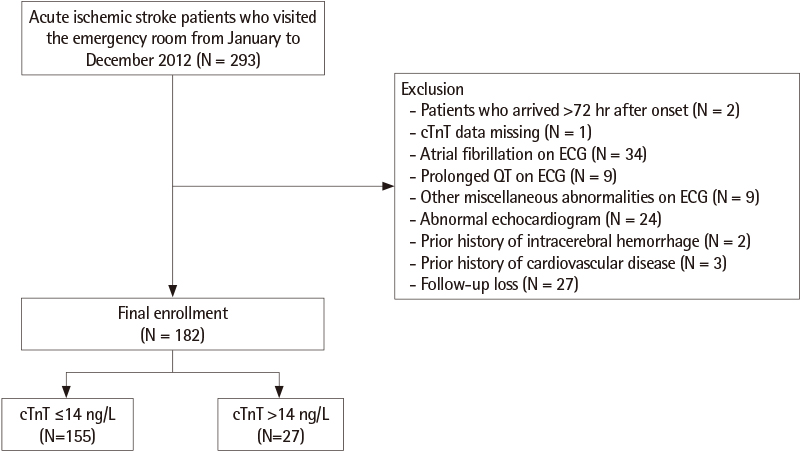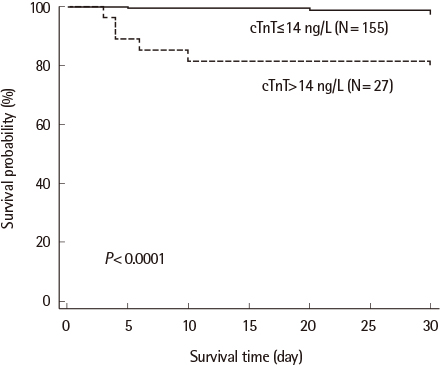Lab Med Online.
2017 Jan;7(1):28-33. 10.3343/lmo.2017.7.1.28.
Prognostic Implications of Elevated Cardiac Troponin T in Patients with Acute Ischemic Stroke
- Affiliations
-
- 1Department of Laboratory Medicine, Seoul Seonam Hospital, Ewha Womans University School of Medicine, Seoul, Korea.
- 2Department of Laboratory Medicine, Ewha Womans University School of Medicine, Seoul, Korea. kshong@ewha.ac.kr
- KMID: 2363003
- DOI: http://doi.org/10.3343/lmo.2017.7.1.28
Abstract
- BACKGROUND
Elevated cardiac troponin T (cTnT) levels have been reported in patients with acute ischemic stroke, however, the prognostic relevance is not well established. We evaluated the association between cTnT elevation and prognosis in patients with acute ischemic stroke.
METHODS
The 182 consecutive patients enrolled had new-onset acute ischemic stroke. Their clinical and laboratory findings were collected retrospectively. Stroke severity and prognosis were determined using the National Institutes of Health Stroke Scale (NIHSS) and the modified Rankin Scale (mRS) scores, as well as 30-day all-cause mortality. The patients were divided into two groups according to their cTnT levels: ≤14 and >14 ng/L. Cox proportional hazards regression analysis was performed to determine the associations between clinical or laboratory variables and 30-day all-cause mortality. The Kaplan-Meier method was used to compare the overall survival rate in patients with elevated and normal cTnT levels.
RESULTS
The cTnT level was elevated in 14.8% of the patients. Age, NIHSS and mRS scores, creatinine kinase-MB, and 30-day all-cause mortality were significantly higher in patients with elevated cTnT levels than in those with normal cTnT levels. The hazard ratio of the elevated vs. normal cTnT group for 30-day all-cause mortality was 8.06 (95% confidence interval: 1.13-57.25, P=0.037). A Kaplan-Meier survival analysis revealed a significantly higher survival rate in patients with normal cTnT levels compared to those with elevated cTnT levels (P<0.0001).
CONCLUSIONS
An elevated cTnT level is significantly associated with poor short-term outcomes in patients with acute ischemic stroke.
Keyword
MeSH Terms
Figure
Reference
-
1. Hong KS, Bang OY, Kang DW, Yu KH, Bae HJ, Lee JS, et al. Stroke statistics in Korea: part I. Epidemiology and risk factors: a report from the korean stroke society and clinical research center for stroke. J Stroke. 2013; 15:2–20.
Article2. Sherwood MW, Kristin Newby LK. High-sensitivity troponin assays: evidence, indications, and reasonable use. J Am Heart Assoc. 2014; 3:e000403.
Article3. Kim SJ, Moon GJ, Bang OY. Biomarkers for stroke. J Stroke. 2013; 15:27–37.
Article4. Kerr G, Ray G, Wu O, Stott DJ, Langhorne P. Elevated troponin after stroke: a systematic review. Cerebrovasc Dis. 2009; 28:220–226.
Article5. Di Angelantonio E, Fiorelli M, Toni D, Sacchetti ML, Lorenzano S, Falcou A, et al. Prognostic significance of admission levels of troponin I in patients with acute ischaemic stroke. J Neurol Neurosurg Psychiatry. 2005; 76:76–81.
Article6. Song HS, Back JH, Jin DK, Chung PW, Moon HS, Suh BC, et al. Cardiac troponin T elevation after stroke: relationships between elevated serum troponin T, stroke location, and prognosis. J Clin Neurol. 2008; 4:75–83.
Article7. Faiz KW, Thommessen B, Einvik G, Omland T, Rønning OM. Prognostic value of high-sensitivity cardiac troponin T in acute ischemic stroke. J Stroke Cerebrovasc Dis. 2014; 23:241–248.
Article8. Barber M, Morton JJ, Macfarlane PW, Barlow N, Roditi G, Stott DJ. Elevated troponin levels are associated with sympathoadrenal activation in acute ischemic stroke. Cerebrovasc Dis. 2007; 23:260–266.
Article9. Etgen T, Baum H, Sander K, Sander D. Cardiac troponins and N-terminal pro-brain natriuretic peptide in acute ischemic stroke do not relate to clinical prognosis. Stroke. 2005; 36:270–275.
Article10. Jensen JK, Ueland T, Aukrust P, Antonsen L, Kristensen SR, Januzzi JL, et al. Highly sensitive troponin T in patients with acute ischemic stroke. Eur Neurol. 2012; 68:287–293.
Article11. Saenger AK, Beyrau R, Braun S, Cooray R, Dolci A, Freidank H, et al. Multicenter analytical evaluation of a high-sensitivity troponin T assay. Clin Chim Acta. 2011; 412:748–754.
Article12. Anders B, Alonso A, Artemis D, Schäfer A, Ebert A, Kablau M, et al. What does elevated high-sensitive troponin I in stroke patients mean: concomitant acute myocardial infarction or a marker for high-risk patients? Cerebrovasc Dis. 2013; 36:211–217.
Article13. Král M, Šaňák D, Veverka T, Hutyra M, Vindiš D, Kunčarová A, et al. Troponin T in acute ischemic stroke. Am J Cardiol. 2013; 112:117–121.
Article14. Stahrenberg R, Niehaus CF, Edelmann F, Mende M, Wohlfahrt J, Wasser K, et al. High-sensitivity troponin assay improves prediction of cardiovascular risk in patients with cerebral ischaemia. J Neurol Neurosurg Psychiatry. 2013; 84:479–487.
Article15. Jensen JK, Atar D, Mickley H. Mechanism of troponin elevations in patients with acute ischemic stroke. Am J Cardiol. 2007; 99:867–870.
Article16. Jensen JK, Kristensen SR, Bak S, Atar D, Høilund-Carlsen PF, Mickley H. Frequency and significance of troponin T elevation in acute ischemic stroke. Am J Cardiol. 2007; 99:108–112.
Article17. Christensen H, Johannesen HH, Christensen AF, Bendtzen K, Boysen G. Serum cardiac troponin I in acute stroke is related to serum cortisol and TNF-alpha. Cerebrovasc Dis. 2004; 18:194–199.
Article18. Jespersen CM, Fischer Hansen J. Myocardial stress in patients with acute cerebrovascular events. Cardiology. 2008; 110:123–128.
Article19. Folsom AR, Nambi V, Bell EJ, Oluleye OW, Gottesman RF, Lutsey PL, et al. Troponin T, N-terminal pro-B-type natriuretic peptide, and incidence of stroke: the atherosclerosis risk in communities study. Stroke. 2013; 44:961–967.
Article20. Oluleye OW, Folsom AR, Nambi V, Lutsey PL, Ballantyne CM. ARIC Study Investigators. Troponin T. B-type natriuretic peptide, C-reactive protein, and cause-specific mortality. Ann Epidemiol. 2013; 23:66–73.
Article
- Full Text Links
- Actions
-
Cited
- CITED
-
- Close
- Share
- Similar articles
-
- Cardiac Troponin T Elevation After Stroke: Relationships Between Elevated Serum Troponin T, Stroke Location, and Prognosis
- The Usefulness of Cardiac Biomarker in Patients with Acute Ischemic Stroke
- Explanatory Power and Prognostic Implications of Factors Associated with Troponin Elevation in Acute Ischemic Stroke
- Prognostic Significance of Troponin Elevation for Long-Term Mortality after Ischemic Stroke
- Acute Coronary Syndrome



